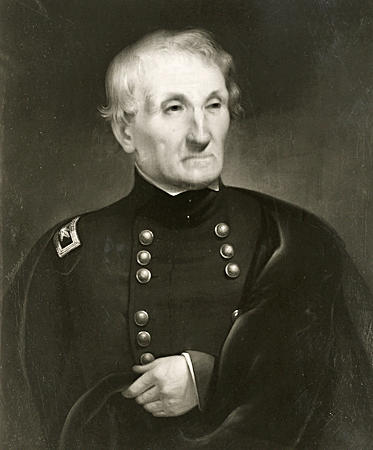

Hugh Brady
Commanding Officer 22nd Infantry
July 6, 1812 - March 3, 1815
The first Commanding Officer of the U.S. 22nd Regiment of Infantry
Hugh Brady was born July 20,
1768, one of six sons and four daughters by John and Mary Brady
in Standingstone, Huntingdon County, Pennsylvania. Brady's
father, Captain John Brady was killed in 1776
during the American Revolution near Muncy, Pennsylvania in a
battle with Native Americans.
Hugh Brady was commissioned an
Ensign in the United States Army on March 7, 1792.
On September 4, 1792 he was assigned to a rifle company in the
Legion of the United States
which was formed to augment the very small standing US Army.
During this time trouble with an Indian confederacy
was more than the state militias could handle and the Legion was
formed on a temporary basis, commanded by
General Anthony Wayne and did most of its training in
Pennsylvania. The Legion was composed of four units,
called "sub-legions" and Brady was in the 4th Sub
Legion. On February 10, 1794 he was promoted
to the rank of Lieutenant and participated in the Battle of
Fallen Timbers, one of the two major battles
fought by the Legion. The campaigns by the Legion resulted in a
peace treaty with the Indians in 1796.
Its reason for existence thus ended, the Legion was disbanded and
Brady received an honorable discharge
on November 1, 1796.
By 1797 Brady had settled in
Sunbury, Pennsylvania. On January 8, 1799 Brady was appointed as
a Captain
in the Provisional Army of the United States, again, a federal
organization raised to augment the small
standing US Army, this time because of tensions between the US
and France. For a couple of years
it looked as if the two countries would actually go to war with
each other so a force was raised in case it was needed.
Brady was made a Captain of the 10th Infantry, which was raised
in Pennsylvania. The 10th consisted of 10 companies
and being a Captain he most certainly would have commanded one of
those companies.
Diplomacy between the two
countries eventually prevailed and the Provisional Army was
de-activated.
On June 15, 1800 Brady was honorably discharged from the 10th
Infantry.
Brady began farming along the
Mahoning River, about fifty miles from Pittsburgh.
He married Sarah Wallace and in 1807 they moved to Cumberland
County. In 1808 he was
commissioned into the Pennsylvania militia by President Thomas
Jefferson.
On July 6, 1812 Brady was again
commissioned into the US Army, by James Madison, this time
as Colonel of the newly established 22nd Infantry Regiment. On
July 14, 1812 he formally assumed command
of the Regiment and for the next two years constantly worked to
recruit the Regiment to full strength.
He was not present at the Battle
of Chippewa but rejoined the Regiment in time to take part
in the Battle of Lundy's Lane, July 25, 1814. As a senior officer
on the field Brady was put in command
of a composite formation of the 9th and 22nd Infantry Regiments
by Brigadier General Winfield Scott.
British artillery fire caused a great deal of casualties among
the Americans at Lundy's Lane
and Brady suffered severe shrapnel wounds in his side and hip.
At forty-four the oldest of
Scott's regimental commanders, Brady continued in action
although he had to be continually helped "off and on his
horse during the engagement,
when he was like to faint from loss of blood."
¹
Scott said "God never made a better man or braver soldier than Hugh Brady." ²
Though command of the formation
had to be given to Major Henry Leavenworth, Brady refused to
leave the field
and followed the troops from a distance. After recovering from
his wounds Brady again assumed command
of the 22nd Infantry on September 29, 1814 and remained in
command until 1815 when the Regiment
was consolidated with other Regiments to form the new 2nd
Infantry. Brady was retained by the Army
and placed in command of the 2nd Infantry on May 17, 1815. In
that same year Brady was placed in command
of Fort Pike at Sackett's Harbor where he remained until 1825.
During his time at Ft. Pike, on
July 6, 1822, Brady was breveted to Brigadier General
" for ten years faithful service in one grade ". ²
In 1827 he was promoted to
Brigadier General and put in charge of the garrison at Detroit.
He participated in the Black Hawk War of 1832. In 1837 he was
given command of Military Department No. 7,
headquartered at Detroit, which position he held for the next
seven years. On May 30, 1848 he was breveted
to the rank of Major General " for meritorious
conduct." ²
Hugh Brady died an accidental
death in Detroit on April 15, 1851. He was at the helm of a
horse-drawn carriage
when the vehicle became entangled in telegraph wires. The wires,
lowered for repairs, caused the horses to panic.
In the panic, Brady was thrown from the carriage and fatally
injured.
At the time of his death Brady
was 83 years old and still a serving officer in the United States
Army
commanding a military district on the Canadian border.
Hugh Brady is buried in Elmwood Cemetery, Detroit, Michigan.
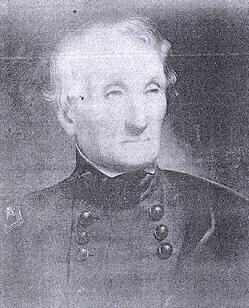
Hugh Brady
courtesy of Donna Cuillard
The following memory of Hugh
Brady was published in the Detroit Free Press on October 14,
1789.
Written by a man who served under Brady in the 1830's, it is a
testament to the kind of leader
and Soldier that Hugh Brady was. The Twenty-second Infantry is
below, somewhat colorfully,
but incorrectly named as "the Twenty-second Foot
corps."
BY-GONES
OF DETROIT -- GENERAL HUGH BRADY
By Hon. George C. Bates
Published in the Detroit Free Press October 14th, 1879
" I love the military ! I love the military ! " ------ Grand
Duchesse
Among
the sweetest memories, and most cherished recollections that
cluster around Detroit in these
beautiful October days, there are none dearer, purer or nobler
than those which are evoked by a visit
to the corner of Jefferson avenue and Hastings street, where the
headquarters of "The Northwestern
Military Department of the United States" were stationed for
so many years from 1835; where dwelt
that pure patriot, superb soldier and true gentleman, Gen. Hugh
Brady, whose nearest neighbor was
the genial, jolly, hospitable Frank Larned, who died years
afterwards as paymaster general
of the United States army.
When I
stood last evening in front of that quiet, unpretending, plain,
old-fashioned house, built by Gen. Brady
in 1835 and occupied by him down to 1851—the time of his
death—and recalled the eminent and distinguished
men who in "by-gone times" used to crowd its hospitable
quarters; when I ran over in my memory
the important national army movements that had been prepared and
mapped out there; when I reflected
that at that time Hugh Brady commanded all the military posts
west of Detroit clear away to the Mississippi,
then our western outpost; and that then, in all that
region—where now are twelve millions of people,
in Nebraska, Wyoming, Montana, Idaho, Utah, Nevada, Colorado,
Oregon, and California—nothing but Indians
and wild beasts roamed over the plains; when I looked upwards to
the twinkling stars, and then down upon
the remembrance of "by-gones in Detroit," I was lost in
amazement at the rise, progress, growth, and
extension of our beloved Union since those days when "I was
young and this old town sheltered me."
Under that humble roof there used to congregate, in olden times,
such men as Gens. Scott, Worth, Macomb,
Wool, Whiting, and all the old army soldiers, each one of whom,
like Gen. Brady himself, could point to
his bleeding wounds received in the war of 1812, for free trade
and sailors' rights, and each one of whom
were eminent heroes, patriots sans peur et
sans reproche, true gentlemen of the old
school,
whose official duties in the far Northwest required an annual
visit to military headquarters here.
There,
too, might have been seen Bishop Onderdonk, of New York, Judge
John Mc Lean, of Ohio,
a man whose massive brow, solemn dignity, and majestic presence
would always remind you
of Washington himself; often there also one might meet Col. James
Watson Webb, many years before
a lieutenant in the army, then editor-in-chief of the New York Courier
and Enquirer, a
splendid, elegant
and accomplished journalist Charles King, too, of the New York Commercial
Advertiser, afterwards
president of Columbia college, who was a kinsman of the Forsyths,
Kerchevals and Kinsies here,
Millard Fillmore, the pompous, precise counselor-at-law,
afterwards President of the United States,
while all along each year from 1830 down to 1842 came new
regiments of infantry and artillery,
commanded by Gen. George M. Brooke, Col. Fanning, Col. Whistler,
Col. Belknap and others, all of whom
clustered around Gen. Brady as heroes of the revolution would
around Washington, and whose families
married and intermarried here, until Detroit became literally the
military headquarters of the northwest;
and to-day, at every outpost of our army, will be found the
children, grandchildren and sons of citizens of Detroit.
It happened to me to visit the first tent ever pitched by the
army of the Union on Puget Sound in 1853,
and the first man who greeted me was an old-time army beau of
this city, and my first visit to Camp Douglass
in Utah was to the quarters of an accomplished army lady, the
granddaughter of Col. Edward Brooks,
collector of this port under Gen. Harrison, and a resident of
Detroit from 1822 down to the time he went
to Washington in 1852, or thereabouts.
But of
all these distinguished military men none was more respected,
loved, admired and sought after
than Hugh Brady. Brave as Caesar, he was as modest as a country
girl. With a vast knowledge of public men
and public measures, he was as quiet and gentle as a lady. Having
again and again faced death on the battle fields
at Chippewa, Queenstown, Niagara and Lundy's Lane, where time and
time again amidst such slaughter
as was never seen on any previous battle field of our country, he
was colonel of the Twenty-second Foot corps,
which crossed bayonets with Col. Basden, colonel of the British
Twenty-first. He was yet so diffident,
so modest, so brave that any mention of his gallant exploits in
his presence would drive him from
the circle of conversation. But whenever duty called him to
action there he went calmly, resolutely to do it.
Not only was Gen. Brady a true soldier, but in all the broadest
aspects of the word, he was an accomplished
American gentleman. And his old home was the seat of hospitality,
kindness, charity, and benevolence.
He was
horn in Northumberland county, Pennsylvania, in 1768, and entered
the army as ensign in 1792,
and joined his regiment with Gen. Harrison, whose commission bore
date the same day, and served gallantly
with Gen. Wayne in his western expedition. After the defeat of
St.Clair he was made lieutenant, February, 1794
and captain in 1799. Having been dropped in the reduction of the
army, he was restored in 1808 by Jefferson,
and during the war he fought heroically under Scott in 1813, all
along the Niagara frontier and at Chippewa,
where Scott in his report of him says:
"Old
Brady showed himself in a sheet of fire," and where he was
wounded in the groin by a ball
striking his sword scabbard, which disabled him. That old battle
sword used to lie on the " buffet" in his
reception room, and beside it another sword, with solid gold
scabbard, set with diamonds, rubies, and pearls,
presented to him by his native state, Pennsylvania, in token of
its appreciation of his services to his country,
a legacy to-day for his descendants, which with his character and
virtues are worth more to them
than all the gold of California, or the bonanza of silver in
Nevada.
Among
the most important of his public duties here on the frontier was
to remove the Winnebagoes
and Pottawattamies from northern Illinois and Wisconsin west of
the Mississippi, which he did in person,
in 1835, with so much prudence, care and kindness that these wild
sons of the prairie actually worshiped him,
and in their incantations and war dances commingled commendations
of their " dear old father."
In
modern times all men who are sent to take care of the Indians are
expected to cheat them of their food,
make them presents, then steal and sell them, and our government
encourages and winks at these frauds,
for the Indian department to-day, in Idaho, Montana, Wyoming and
Utah, is officered by a band of thieves
much worse than Charles Williamson and his gang, who robbed the
stage on the way to Deadwood, in July last,
as the writer hereof can demonstrate, if permitted to bring
witnesses before congress.
But had
any public governmental thief stolen so much as a handkerchief
from the Indians under
Hugh Brady's care, he would have been hung under the nearest
tree, and his superiors in Washington,
if confederates, would have shared the same fate. The army then,
and now too, thank God, had on its muster rolls
no Indian thieves, or whisky thieves, and to-day if the Indians
were turned over, as they ought to be,
to Sherman, Sheridan, Terry, Miles, Merritt, and such men, would,
under honest treatment, become peaceful
and quiet. Modoc Jo, Sitting Bull, and Nez Perces Jo have all
been driven to take up arms by a persistent course
of villainy, robbery, and plunder by Indian agents and officers
in our territories that would disgrace
all the road agents of the Black Hills; and every man from the
mountains knows and has evidence of this.
But the
most delicate duty devolved upon Gen. Brady was the maintenance
of peace and law upon the frontier
during that war called the "Patriot War," commencing in
1836, and ending with the Ashburton treaty of 1841.
Time and space forbid me now to give the history of this singular
uprising in Canada, which almost culminated
in war between the Kingdom of Great Britain and the United
States. But to Winfield Scott and Hugh Brady
both nations are indebted for the continuance of peace.
During
the winters of 1836-7-8-9, large bodies of men, claiming to be
acting under orders of Canadian patriots,
collected along our frontier and threatened invasions and
incursions into Canada contrary to the neutrality laws
of the United States; and in order to arrest and prevent such
operations Gen. Brady at first with a few
United States recruits and the old Brady Guards—a splendid
independent military company composing
the very elite of the young men of Detroit—had to guard this
frontier from Fort Gratiot on the north
to Cleveland on the south; to move his troops from time to time,
whenever the patriots gathered, and aiding
and assisting Col. Daniel Goodwin as United States district
attorney, and Conrad TenEyck as United States
marshal, to arrest and disperse all who threatened to invade
Canada. Old as Gen. Brady was, he was always
on hand ; and whenever or wherever a band of patriots gathered,
there the old chief was ready
to pounce upon them.
As an
evidence of his coolness and brave devotion to duty and his
country, let the following incident
be preserved: On the afternoon of February 18, 1838, one of the
very coldest days in all the winter,
a large body of patriots and tatterdemalions generally had come
up from below, near Toledo, and all along shore:
had crossed on the ice and taken possession of fighting island in
British waters. They carried with them
several pieces of artillery, and as soon as they made a landing
commenced to erect their camps, and throw up
temporary fortifications. The alarm was soon sounded along the
frontier, although we had then no telegraphs,
and Judge Wilkins as district judge, TenEyck and Goodwin as civil
officers of the United States,
soon summoned Gen. Brady and his troops to take position on the
American shore opposite the island,
and so capture, arrest and punish all the patriots, if they
should fall back into the United States, for breach
of the neutrality laws. The cold was frightful, but Gen. Brady
instantly moved in sleighs the whole command
to the point designated, composed of Brady Guards about 120
strong and some 700 of United States recruits
that Gen. Scott had pushed on from Buffalo on the old steamer
United States, which landed here about
the 12th of February, 1838, the lake having been open all that
winter, until closed by the intense cold
of the last few days.
The
Brady Guards, of which the writer was one, and the recruits got
into position in front of fighting island.
About 4 o'clock p. m. pickets were thrown out for some miles
above and below the island, and strict orders
were given to the command to halt and arrest all persons
"going to and from the island, and, if resilience
was offered, to destroy and crush them."
Hugh
Brady, then just seventy, moved up and down that line straight as
an arrow and every inch a soldier,
quietly giving his orders and encouraging all the men—some
of whom strongly sympathized with the patriots—
to do their entire duty. Having completed his own arrangements,
he called to the front Lieut. Edmund Kearsley,
of "the Brady Guards," and his own aid of the regular
army and giving this message to them
in tones which were heard along the lines he dispatched them on
the ice to Maiden, where old Col. Basden,
of the twenty-first English foot, commanded the garrison, the
same old hero who had crossed bayonets
with Brady, in 1813, at Lundy's Lane. " Present," he
said, " Gen. Brady's compliments to Col. Basden,
and say to him that I am here in command of the United States
troops, with Judge Wilkins,
the United States district attorney and marshal; and that if the
patriots shall break up and retreat
from fighting island to our shore, I shall arrest, and my
government will try and convict them."
Now Col.
Basden was an old-fashioned soldier, and at his mess dinner he
and his brethren in camp
drank deeply, and it so happened Brady's envoys arrived and
delivered the message when they were all
deep in their potations.
Col.
Basden received the message without even asking its bearer to sit
down, and instantly replied :
" Present Col. Basden's respects to Gen. Brady, and say that
I have the highest respect for him personally
as a soldier and a gentleman, but that I have none for his
government and its outlaws; that I shall attack
with all the force at my command those damned rascals on fighting
island as soon as I am ready,
and if they retreat over the United States line I will follow and
destroy them whereever I may find them."
He then rudely dismissed the envoys. Just at early twilight, that
fearful cold night, the long roll beat
and our whole command rushed to arms, formed in line of battle,
and waited for what next was to come.
With all
possible dispatch some twenty soldiers, with guidons, or red
flags, were sent to mid-channel
on the Detroit river, on the American side of Fighting island,
and measuring off distances,
planted those flags on the ice, some hundreds of rods apart, thus
marking clearly and distinctly,
the dividing line between Canada and the
United States. This done, the bugle sounded
the call, the troops
formed in hollow square, old Hugh Brady in the centre, when,
taking off his hat, and the troops uncovering,
he repeated distinctly his message to Col. Basden, the rude reply
received, and, pointing to those flags,
he said : "Men, that is the boundary line between our
government and the British. If a damned red-coat
crosses that line, attack them—beat them back ; and I have
faith you will do it." The troops marched
to their several positions, the sentinels, wrapped in overcoats
and blankets to keep from freezing,
resumed their weary rounds, and all waited in anxiety for what
next might happen. The old Brady Guards,
the very best volunteer troops ever organized, thought that they
snuffed the scent of battle afar,
and were eager to see how they would feel under real fire. Night
wore away—cold, oh so cold—
and about 4 o'clock A. M. the rumbling of the British artillery
was heard on the ice opposite the island,
and directly the roar of cannon along the line, the skipping of
balls on the ice, the knocking of snow
and ice from the trees, which could plainly be seen, told that
work had at last begun in earnest, with shot and shell.
Our call
sounded and line of battle was promptly formed, Gen. Brady
watching every detail,
and like the old war horse he walked to and fro as if ready for
anything, and our men watched
with breathless interest what was to come. Soon the patriots
broke and fled, and our troops arrested them
in large numbers as they came to the shore, After a brief
cannonading we heard the rattling drum and
shrilly fife of the British troops. Breaking into two columns,
one from the right, the other from the left,
they marched like one man, above and below Fighting island,
endeavoring to capture the retreating patriots,
and we watched them coming on until to our great relief we saw
that they kept close to, but moved not
beyond the British lines, and as they filed away great red-coated
beef-eaters and beer-drinkers,
stood in silent
admiration of their prudence and our good luck; it was simply
because old Hugh Brady was there,
and would tolerate no huzzas from our rejoicing hearts.
But I
must pause. These memories grow as I recall that noble patriot
and those by gones. In 1851,
in driving a team of spirited horses, they became entangled in
telegraphic wires dropped from poles for repairs,
ran away with him, threw him from the carriage, fatally injured
him and God called him away.
But as he had lived a soldier's life, so he died like a soldier.
When his hour had come, and his weeping family
saw that his end was near, they sent for the Rev. George
Duffield, their pastor, a man whose long life illustrated
in all his acts and doings the characteristics of his master
Christ, himself, whose purity, devotion, self-denial,
eloquent appeals and keen admonitions to the erring, made him the
man for all true Christians to imitate,
and to whom the writer hereof is under greater obligations than
all his spiritual pastors and masters.
Mr. Duffield came. The family gathered around the bed-side of
that poor old man, and kindly and quietly
as a child took the hands of the soldier to tell him death was at
last there, and this colloquy then ended
all there was on earth of Hugh Brady.
"
General, you are very ill, my friend, very ill."
The General opened his eyes and pressing Mr. Duffield's hand
replied :
"Yes. Yes, sir, I know it. I know it."
" But, General, you are badly hurt and very ill,"
"Oh, yes," he faintly replied; "yes, I know it,
Mr. Duffield."
A pause — a silence — a few deep sobs — when Mr.
Duffield said :
" But, General, you are very, very ill. I am sorry to tell
you you are just about to die."
Instantly
raising himself up straight as in health, his eye flashed under
his bandaged forehead
and he firmly spoke out:
" Mr. Duffield, let the drum beat; my knapsack is slung; I
am ready to die,"
and sank away into the arms of death.
His
funeral escort was commanded by Col. Whistler, and consisted of
the Fourth United States Infantry,
in which Grant was captain, and 136 Brady Guards constituted the
mourners, and as
"The
soldiers discharged their farewell shot
O'er the grave of our hero we buried,"
They
were forever disbanded, and now — gray-haired, worn out
— they are among the
"By-gones of Detroit;" but may the family of Hugh
Brady, and his namesakes, the old Brady Guard,
be ever ready in all hours of their lives, and especially in its
last moments, to echo his dying words :
"Let the drum beat; my knapsack is slung."
But
Brady is not dead—he but sleepeth;
For the brave die never; being deathless,
They but exchange their country's arms
For what is now their country's heart.
Give then the dead their due.
'Tis They who saved us.
**********************
The following poem was written by D. Bethune after Brady's death:
"And manly eyes may
weep today,
As sinks the patriot to his rest,
The nation held no truer heart.
Than that which beat in Brady's breast. "
**********************
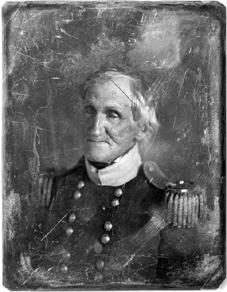
Hugh Brady as a
Brigadier General
Photo believed to be taken by the famous photographer
Matthew Brady.
Date of photo also believed to be 1848, just before Brady's
brevet to Major General
|
The Late General Brady - From the
De Transcription by Donna Cuillard |
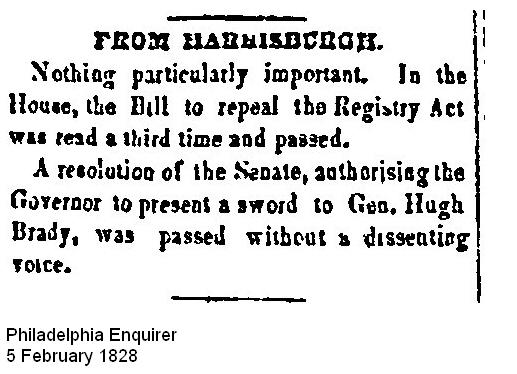
Above: A news clipping reporting the
presentation of a sword to General Hugh Brady by the Pennsylvania
legislature in 1828.
This sword is mentioned in the article posted above by George
gates.
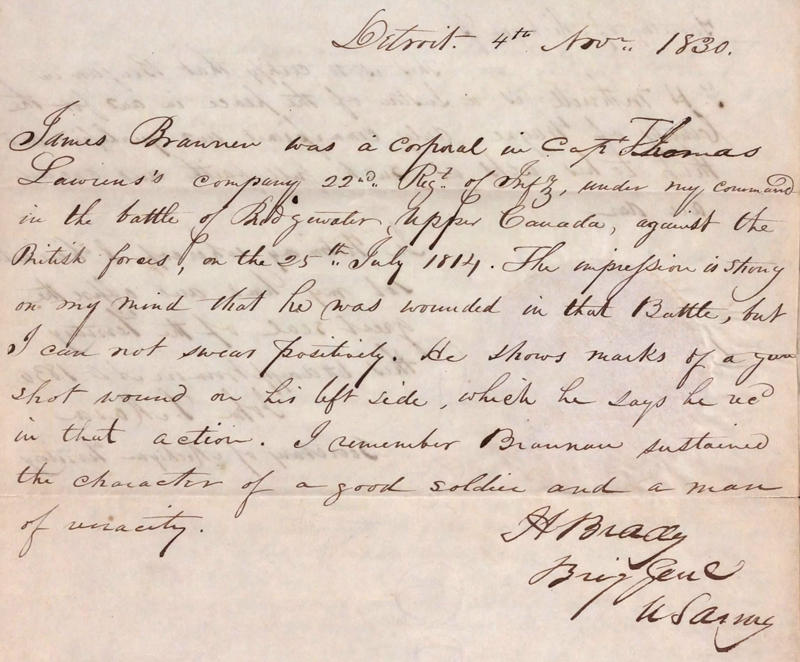
Above: An affadavit written by
Brigadier General Hugh Brady on behalf of Corporal James Brannan
who served in the 22nd Infantry
and was wounded at the Battle of Lundy's Lane (here called the
battle of Bridgewater.) Brannan was applying for a pension since
he
could no longer work because of the lingering effects of his
wounds. Brady dated the affadavit as being written at Detroit
on November 4, 1830 and signed his name in the lower right hand
corner as a Brigadier General of the U.S. Army.
From War of 1812 Pension Applications.
Washington D.C.: National Archives. NARA Microfilm Publication
M313
Records of the Department of Veterans Affairs, Record Group
Number 15.
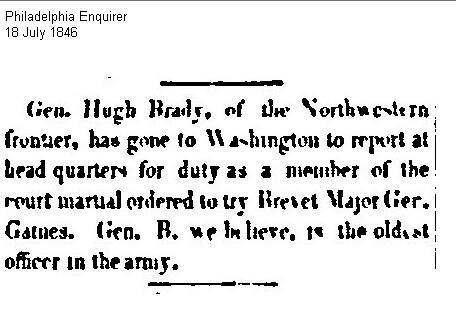
The court martial mentioned in the news
clipping above, to which General Hugh Brady was called, was of
Major General Edmund P. Gaines.
Gaines was a hero of the War of 1812, being promoted to Brigadier
General during the conflict, retained by the Army after the War
and later breveted to Major General. In 1836 he was placed in
command of the Southwest Military District. He was given
instructions
to fortify the border of the Louisiana Territory and Texas in the
case that the Mexican army might threaten U.S. territory. He was
also given orders
to post guards preventing any U.S. soldiers from crossing into
Texas and fighting in the rebellion. He was in command of the
Army's Western Division
at the outbreak of the Mexican-American War. He was reprimanded
by the U.S. government for overstepping his authority by calling
up
Louisiana volunteers for Zachary Taylor's army. He nevertheless
called up volunteers from other southwestern states and received
a court-martial
but was able to successfully defend himself. Gaines retained his
rank and authority and was in command of the Western Division
when he died at New Orleans, Louisiana on June 6, 1849.
Note in the above clipping that General Hugh
Brady is described as the oldest officer in the army, a
distinction Brady appears
to still hold. Research by the website editor could not find
anyone serving in the US Army at an age older than Brady,
for any time period. Even Brady's former commander from the War
of 1812, Major General Winfield Scott, who, when he retired,
had served as a General Officer for more than fifty years, was
younger than Brady by almost ten years.
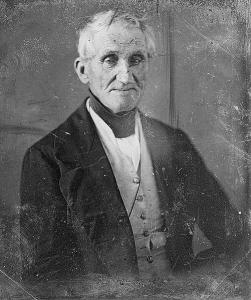
A photograph of Hugh Brady, date unknown, but taken most certainly late in his life.
Birth: July 20, 1768
Death: April 15, 1851
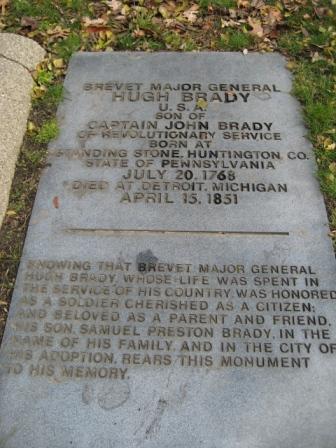
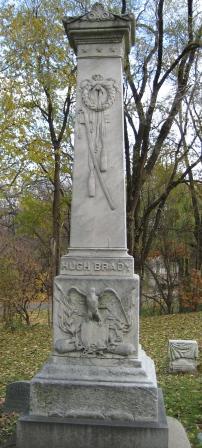
Hugh Brady's grave in Detroit.
The above photos of Brady's
grave and memorial are by Kim Jacobson,
and are taken from the website: Find
A Grave Memorial
**********************
¹ Passage taken from:
Where Right and Glory Lead ! by Donald E. Graves Published by Robin Brass Studio, Toronto 2000
² Pennsylvania State Archives, via Donna Cuillard
A very special
Thanks to Donna Cuillard, Member of the Board of the Brady Family
Association,
for the news clippings above and for sharing illustrations and
important historical research and information
about her ancestor, General Hugh Brady.
Editor's note: The only
photos or illustrations of COL Hugh Brady the website was able to
find are taken of him during his later years,
after he became a General officer. Anyone having illustrations of
Hugh Brady showing his appearance during the
time frame when he was commander of the 22nd Infantry, who would
wish to share such with the website,
please contact the webmaster at: webmaster@1-22infantry.org
Top illustration from the Burton
Historial Collection, Detroit Public Library
via Detroit Public Library Digital Collections
Home | Photos | Battles & History | Current |
Rosters & Reports | Medal of Honor | Killed
in Action |
Personnel Locator | Commanders | Station
List | Campaigns |
Honors | Insignia & Memorabilia | 4-42
Artillery | Taps |
What's New | Editorial | Links |